

Baumrind’s Parenting Styles – Parenting and Family Diversity Issues. The parenting style used to rear a child will likely impact that child’s future success in romantic, peer and parenting relationships.

Diana Baumrind, a clinical and developmental psychologist, coined the following parenting styles: authoritative, authoritarian, and permissive/indulgent, Later, Maccoby and Martin added the uninvolved/neglectful style. It is beneficial to evaluate the support and demandingness of a caregiver in order to determine which style is being used and how to effectively use it. Support refers to the amount of affection, acceptance, and warmth a parent provides to a child. A Review of B. F. Skinners Reinforcement Theory of Motivation. Changing Behaviour through Reinforcement and Punishment: Operant Conditioning – Introduction to Psychology – 1st Canadian Edition. Learning Objectives Outline the principles of operant conditioning.Explain how learning can be shaped through the use of reinforcement schedules and secondary reinforcers.
In classical conditioning the organism learns to associate new stimuli with natural biological responses such as salivation or fear. The organism does not learn something new but rather begins to perform an existing behaviour in the presence of a new signal. Reinforcement vs Punishment Psychology [Examples] Reinforcement and punishment are often used as parenting tools to modify children’s behavior.
![Reinforcement vs Punishment Psychology [Examples]](http://cdn.pearltrees.com/s/pic/th/reinforcement-punishment-183049524)
Let’s review the difference between positive reinforcement and negative reinforcement, and the difference in outcomes between them. The Difference Between Positive And Negative Reinforcement. 12 Examples of Positive Punishment & Negative Reinforcement. You might be thinking that “positive punishment” sounds like an oxymoron, after all, how can punishment be positive?

Not many people “like” punishment, right? The disconnect in understanding this concept comes from the usage of the word “positive;” here at PositivePsychology.com, we generally use the term “positive” to refer to things that are inherently good, things that are life-giving, and things that promote thriving and flourishing. The Difference between Positive/Negative Reinforcement and Positive/Negative Punishment.
February 5, 2013 7:40 pm Published by Kelley Prince M.A., BCBA In Applied Behavior Analysis, there are two types of reinforcement and punishment: positive and negative.
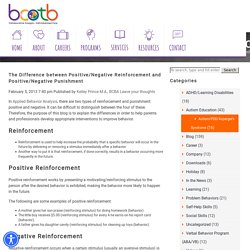
It can be difficult to distinguish between the four of these. Therefore, the purpose of this blog is to explain the differences in order to help parents and professionals develop appropriate interventions to improve behavior. Positive Punishment and Operant Conditioning. Positive punishment is a concept used in B.F.

Skinner's theory of operant conditioning. How exactly does the positive punishment process work? The goal of any type of punishment is to decrease the behavior that it follows. What are the challenges that parents face while talking to their teenagers? Teenagers sometimes live in their own bubble and at this stage, the parents face a lot of problems to deal with their emotional trauma and changing demands.
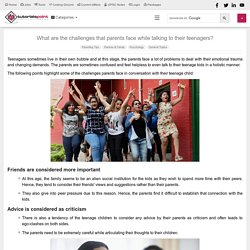
The parents are sometimes confused and feel helpless to even talk to their teenage kids in a holistic manner. The following points highlight some of the challenges parents face in conversation with their teenage child: Friends are considered more important. 10 Common Problems and Issues Teenagers Face Today - WeHaveKids - Family. I took a good look at my teenager, followed him around, interviewed him and other teenagers, did some research, and this is what I found.
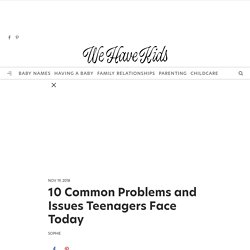
Teen Issues Recently, I attended a school program with other parents of teenagers. The conversation was mainly complaints about raising teenagers. Teenage Phase or Out of Control? How do you know if your child is going through an adolescent phase, or if his out-of-control behavior is here to stay?
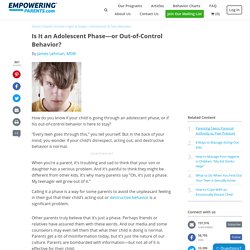
“Every teen goes through this,” you tell yourself. But in the back of your mind, you wonder if your child’s disrespect, acting out, and destructive behavior is normal. When you’re a parent, it’s troubling and sad to think that your son or daughter has a serious problem. And it’s painful to think they might be different from other kids. Parenting A Teen Through Positive Reinforcement - Back On Track.
Most parents can agree: the teenage years can be rough!
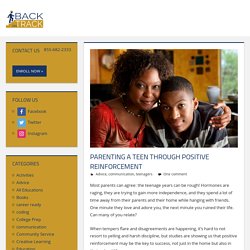
Hormones are raging, they are trying to gain more independence, and they spend a lot of time away from their parents and their home while hanging with friends. One minute they love and adore you, the next minute you ruined their life. Can many of you relate? Parenting Children with Positive Reinforcement (Examples + Charts) Children don’t come with instructions and discipline is often experienced by parents and children alike as an arena where our will and wits are tested.
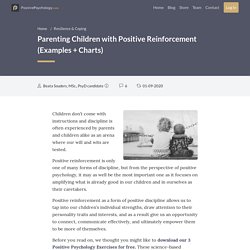
Positive reinforcement is only one of many forms of discipline, but from the perspective of positive psychology, it may as well be the most important one as it focuses on amplifying what is already good in our children and in ourselves as their caretakers. Positive reinforcement as a form of positive discipline allows us to tap into our children’s individual strengths, draw attention to their personality traits and interests, and as a result give us an opportunity to connect, communicate effectively, and ultimately empower them to be more of themselves. Before you read on, we thought you might like to download our 3 Positive Psychology Exercises for free. You can download the free PDF here. Why Negative Reinforcement Works Better as Your Child Grows into A Teen. If you are someone who has always loved the freedom of “no strings attached”, the idea of marrying and having kids could be quite underwhelming.
The idea of having a family always used to bug me, until I finally found the love of my life. It's when I categorically made up my mind about what I wanted from our marriage. I wanted kids, I was clear about that, but I wasn’t certain how I would be taking care of them. The Outgrow of Parenting Fears and My Redemption A year after my marriage, I got pregnant with a baby boy. Positive Reinforcement for Adolescents. By the time children have reached adolescence, their responses are often ingrained, but parental actions can still positively affect adolescent behavior. Since adolescents are struggling to develop their personal identity and are concerned about their body image, parental support is crucial to help positively frame experiences as learning opportunities. Positive reinforcement remains a powerful teaching tool during these formative years, and we encourage parents to take time to contemplate the ways they can help adolescents mature and become self-reliant.
BYU Study: a need for positive reinforcement among teens. There are countless publications describing the best ways to raise a child in the hopes of them becoming successful adults. Between the books, magazines and video tutorials, parents may be finding themselves overwhelmed on more than one occasion. But a group of researchers at Brigham Young University have found the answer to helping children through life may be less complicated than it seems. The BYU study found bad behavior can be discouraged among children by simply encouraging good behavior. Teenagers: 20 tips for good behaviour. 1. Take time to actively listen Actively listening means paying close attention to what your child is saying and feeling, rather than thinking of what you want to say next.
This shows your child that you care and that you’re interested. 2. Set clear rules about behaviour Family rules make expectations about behaviour clear. UNICEF: Designing Parenting Program Guidance Note. New perspectives on adolescent motivated behavior: Attention and conditioning. Adolescent learning: rewards, punishments, and the importance of context: BOLD. Parenting Quote 1. Parenting Quote 2. Parenting Quote 3. Parenting Quote 4. Parenting Quote 5. Parenting Quote 6. The Use of Reinforcement and Punishment in Shaping a Child's Behavior.
Skinner’s Operant Conditioning: Rewards & Punishments. Positive Reinforcement - Tips for teaching and parenting. Be a better parent by partnering with your teen.